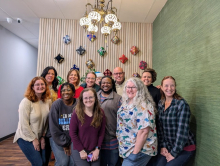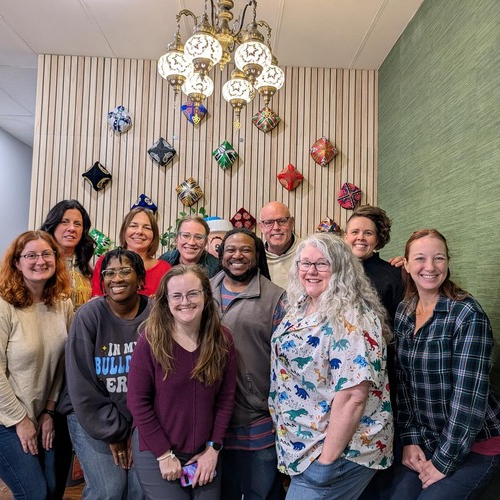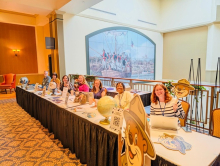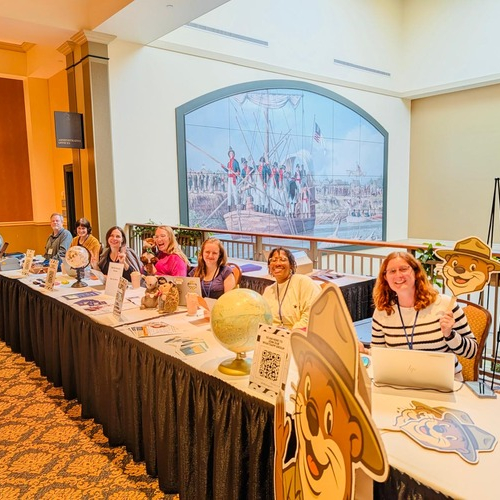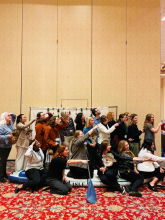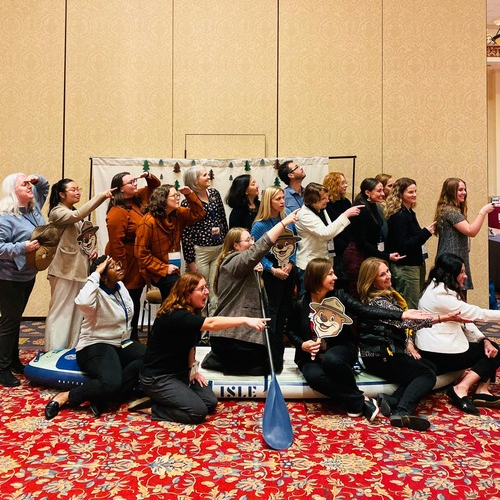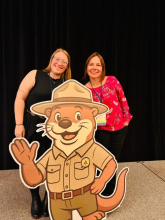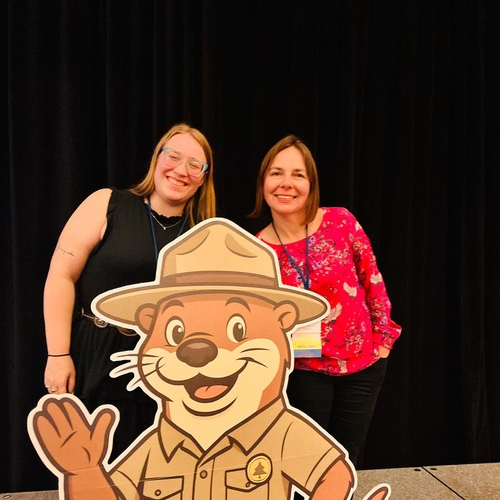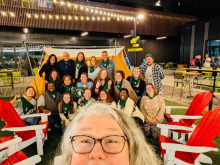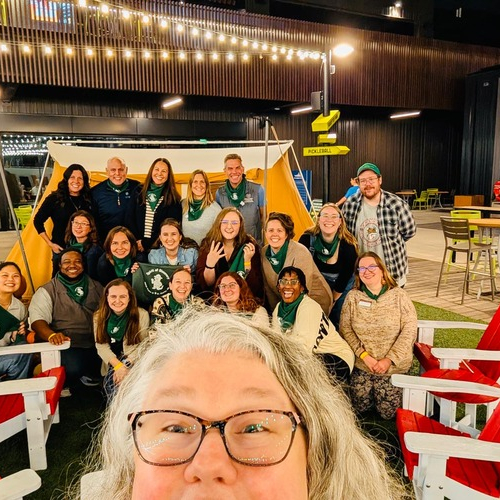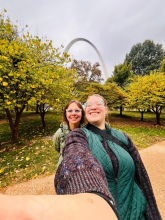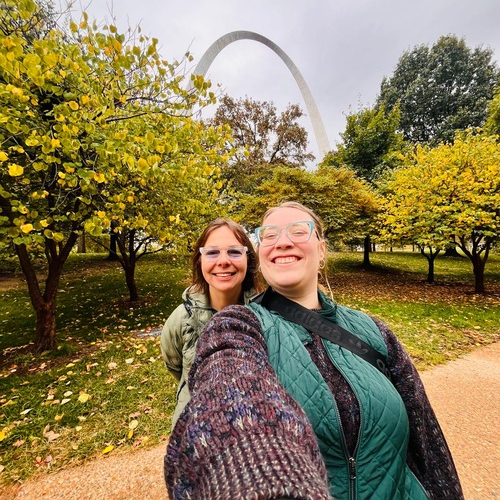Reflections from the 2025 NAFSA Region IV Conference
From October 27–30, 2025, two staff members from the UNI International Engagement Office had the opportunity to attend the NAFSA Region IV Conference, where international education professionals from across the Midwest gathered to connect, collaborate, and share innovative practices.
NAFSA Region IV consists of professionals from the following states: Missouri, Minnesota, South Dakota, North Dakota, and Iowa.
During this event, Edyta Cichon (OIE Immigration Advisor) served as the Conference Registrar, shining a light on the behind the scenes work of bringing together the international education community, while Ava Deitrich (OIE Student Services Coordinator) serves as the current NAFSA Iowa State Representative. Read more about their insight, experiences, and reflection on the conference below.
Take a peek inside the NAFSA Region IV Conference—a place where ideas spark over coffee, connections turn into collaborations, and professionals from across the region gather to shape the future of international education. Here’s a closer look at the people and moments that make the conference unforgettable.
Spirit of Discovery - Reflections from the 2025 NAFSA Region IV Conference
Edyta Cichon, NAFSA Region IV Conference Registrar, UNI Immigration Advisor
Organizing a conference starts well in advance with a good group of individuals who are passionate about international education and organizations that support them and their efforts (big thanks to my supervisor, Carolina Coronado-Park, and UNI for allowing me this opportunity). The professionals mostly come from the higher education field; however, our region had some immigration attorneys offer their time and expertise as well.
As the conference registrar, I started my involvement early when the conference was starting to take shape in its early form, when the events accompanying the conference sessions and workshops were proposed and the schedules created. Later on, my role shifted into monitoring the registrations and providing updates to the rest of the conference executive team. During the conference, I act as the main point of contact for all things related to the registration table, including daily equipment setup, reprints, and registrations during the conference. I would not be able to participate in the conference and be the conference registrar without fabulous volunteers who offer their time to help out at the registration table and have their chance to connect with others. This role allowed me to be more involved in the conference's organizational aspects and to connect with others while giving back to the region.
Among the sessions I have attended this year were:
Surviving the Trump Tsunami: Advising Students/Scholars Amidst Rapid Change
Green Cards 101 for International Student Advisors
Discovering the Spirit: The NIL Era and F-1 Student Athletes
Iowa State meeting & lunch
How to Advocate in a Red State
The Kobayashi Maru - Finding hope in a no-win scenario
This year has been particularly uncertain for the population I work with and advise. Staying informed and up to date about the recent changes and announcements is vital for international students and scholars, as well as the wider campus community. Being able to reach out to others who work with similar groups and are able to offer advice, perspective, and a sense of hope is essential. Some of these connections are made during the sessions at the conference, where there are plenty of occasions to exchange contact information, and also learn what topics others are passionate about or have a lot of experience in. There are no two institutions that are the same; each advisor is exposed to different cases and questions.
Most of the sessions I have participated in were full of conference attendees, eager to learn and offer their own perspective. Two sessions were presented by the immigration attorneys with vast knowledge and experience. While most of my day-to-day work consists of advising F-1 and J-1 individuals, at times, I get questions from potential students in different immigration statuses. It is extremely helpful for me to know how different statuses relate to each other. It is also important to know when some situations are outside the scope of my position, and the best suggestion I can have for that individual is to insist that they speak with an experienced immigration attorney. The more I know, the better I am able to advocate for the students and offer suggestions. The opportunity to participate in sessions and meetings with the immigration attorneys allows me to better understand the situations the students are in.
With an increasing number of athletes who are also international students, it was important to learn more about NIL (Name, Image, Likeness) and how the recent changes in law regarding that could possibly have implications for our international student-athletes. Attending the last two sessions allowed me to find a different perspective and find hope for the future.
Being able to reach out to others who work with similar groups and are able to offer advice, perspective, and a sense of hope is essential.
Connecting, Collaborating, and Creating Community
Ava Deitrich, NAFSA Iowa State Representative, UNI International Student Services Coordinator
This year’s conference provided a platform to exchange ideas on student engagement, policy updates, and university–community partnerships—while also highlighting the resilience and creativity of our field.
In addition to participating in sessions and workshops, I was honored to represent the state of Iowa as the NAFSA Iowa State Representative and to assist the conference executive team with on-site operations. This dual role allowed me to engage in statewide conversations about connection and professional development, while contributing to the smooth running of the regional event.
Bringing Iowa Together: State Luncheon and New Initiatives
As part of my responsibilities, I hosted the Iowa State Luncheon, which brought together approximately 20 professionals representing institutions, organizations, and programs from across Iowa. Our discussion centered on how we can reimagine connection and collaboration within the state’s international education community.
While Iowa has previously hosted the Iowa International Education Conference, shifting budgets and staffing realities have made it challenging to sustain large-scale, in-person events. To adapt, our committee proposed a new model of traveling workshops—half-day events hosted in different regions of the state. These sessions would be more cost-effective, reduce travel barriers, and strengthen local networks by connecting nearby institutions and community partners.
Additional ideas included:
- Revitalizing the Iowa International Education Conference 2026 with a refreshed format and inclusive topics.
- Hosting Zoom seminars for statewide professional learning and information sharing.
- Creating a WhatsApp group to facilitate real-time communication among Iowa international educators.
- Focusing on 1:1 networking and locally relevant collaborations.
These new approaches reflect Iowa’s commitment to staying connected, innovative, and accessible—even amid evolving professional landscapes.
Conference Highlights: Sessions and Key Takeaways
Throughout the week, I attended several impactful sessions focused on student engagement, community partnerships, and cultural understanding. Below are highlights from a few that stood out most.
Intentional International Student Programming
Institutions shared models for designing structured, intentional programming that fosters belonging and cross-cultural engagement. Institutions also discussed creative ways to increase student ownership in programming—such as international food festivals and student-led initiatives—allowing staff to step back and empower student leadership.
Another session focused on reimagining peer programs to balance structure, sustainability, and genuine connection. One university shared its journey of redesigning its International Friendship Program, moving away from the unrealistic promise of “friendship” toward a more attainable goal of connection and community-building.
Collaborative University–City Strategies for International Student Belonging & Retention
This session explored partnerships between universities and local governments to help international students build deeper connections beyond campus. A standout case study featured the University of North Dakota and the City of Grand Forks (population ~50,000). Their collaboration has resulted in internship partnerships with local employers, civic engagement tours, and community events such as The Longest Table and Global Friends. These efforts not only address social isolation but also highlight international students as an untapped pool of talent contributing to regional development.
Cultures of Preferences and Their Impact on Learning
Presented by Dr. Tammy Orahood, Director of Global Programs at WashU’s Brown School, this session examined how cultural preferences shape learning experiences—particularly among Chinese students studying in the U.S.
Drawing from her dissertation, Dr. Orahood emphasized that all learning is cultural, and that both students and educators view one another through their own cultural lenses. Her findings highlighted:
- The critical role of peer support in academic and social adjustment.
- The need for faculty training to increase awareness of cultural learning differences.
- The benefit of pre-arrival education on U.S. classroom norms, rather than relying solely on orientation.
- The effectiveness of ongoing, student-led programming throughout the year to sustain learning and connection.
Her research reinforced that supporting international students requires not just structural resources, but also a shift in mindset—from a deficit view of “adjusting” to an appreciation of diverse learning cultures.
Looking Ahead
Attending the 2025 NAFSA Region IV Conference was an energizing and inspiring experience. It reaffirmed the power of collaboration—both across state lines and within our own local networks. As we continue to adapt to evolving global and institutional realities, one theme remains constant: intentional connection.
By bringing professionals together through traveling workshops, fostering innovative programming on our campuses, and deepening partnerships between universities and communities, we can continue to make international education more accessible, inclusive, and impactful for all.

